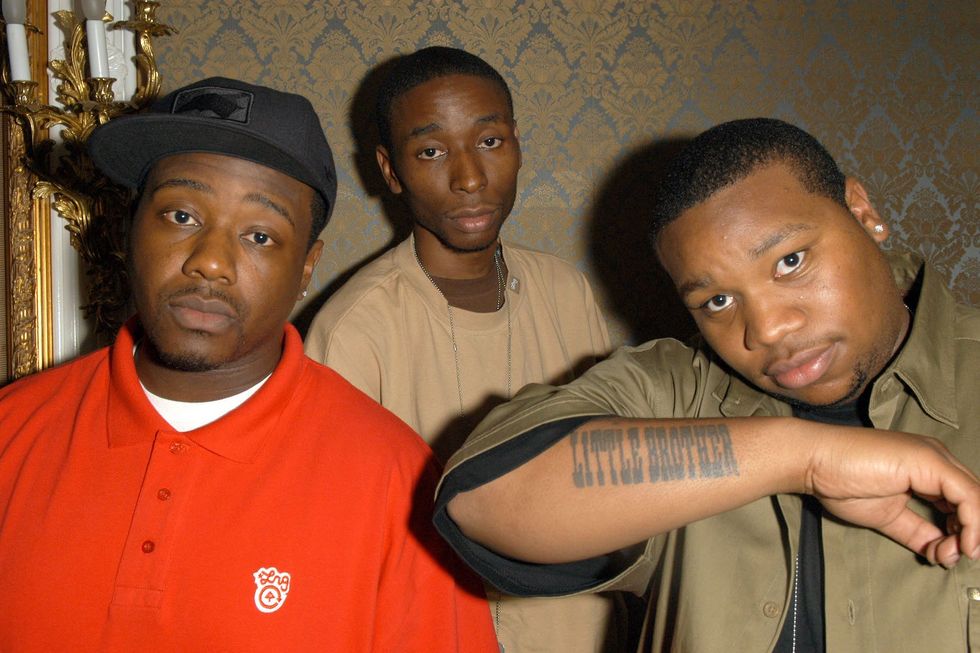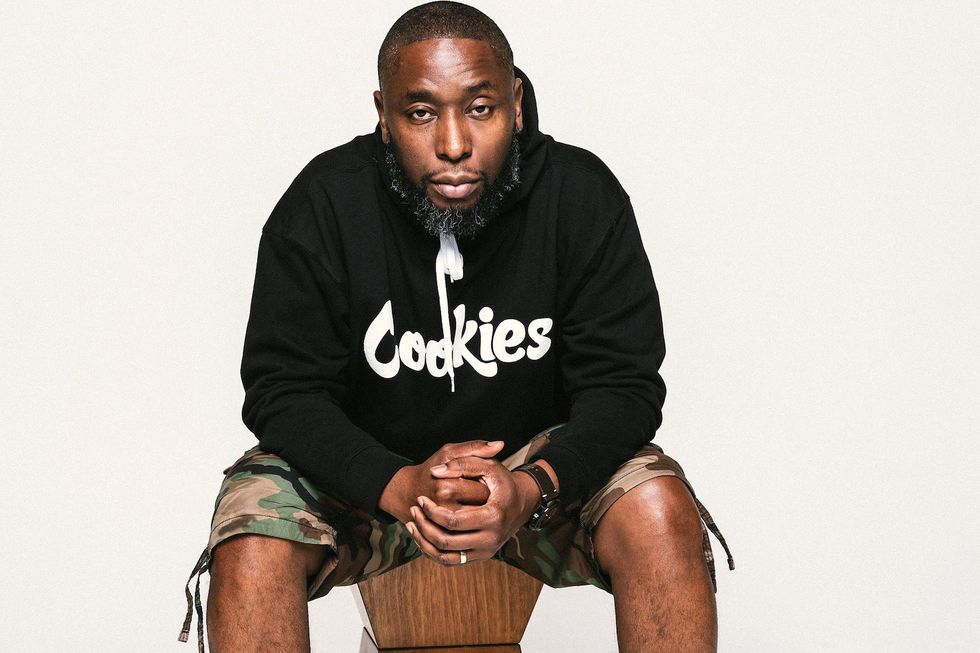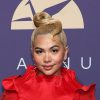-
 play_arrow
play_arrow
DisnDat HITZ DisnDat HITZ
-
play_arrow
Warlando Hitz Warlando Hitz
-
 play_arrow
play_arrow
DisnDat Tunez Reggae,Dancehall and Afro Beats
Behind the Beat: How Kendrick Lamar’s “DUCKWORTH.” Became 9th Wonder’s “Magnum Opus”

Having inspired generation-after-generation of bedroom beatmakers to chop up soul samples with Fruity Loops software, North Carolina’s 9th Wonder (real name Patrick Denard Douthit) is that rare figure who has genuinely reinvented the art form of rap production.
His beats tend to marry raw, air-popping drums — which sound like they’re being beatboxed through wet lips — with yearning howls from old gospel records. And over the years the results from this musical approach have regularly been hypnotic, with 9th Wonder crafting the Blog Era-meets-De La Soul sonics that propelled Little Brother into underground royalty; the gutter chime that inspired JAY-Z to threaten “to put the boy in the box like David Blaine;” a bold mash-up of a Nas album via God’s Stepson; and even transforming a perspicacious love song by long-forgotten 1970s R&B group The Independents into a church confessional that allowed infamously brazen gutter rapper Sean Price to purge some of his demons (“I love my moms and her drug habit”) with “Heartburn.”
If you have ever used a biro to scribble down conscious raps onto a piece of A4 paper then you probably had a dusty, soul-stirring instrumental lifted from the producer’s Zion instrumental series guiding you in the background, while the 9th Wonder sound was recently immortalized when the 48-year-old from Midway, North Carolina was given a new mural in Winston-Salem’s arts district — a rare honor usually only reserved for dead men.
Yet despite a career packed full of milestones, there’s clearly one beat in the 9th Wonder oeuvre that the producer believes shines just a little brighter than everything else. “It’s my magnum opus,” he said during a rare phone interview with Okayplayer. “The fact the music changes three times and has that insane plot twist at the end? It is more like a movie than a rap song.” A Hitchcockian thriller set in Compton, perhaps? “Exactly that, yes.”
The song 9th Wonder is referring to, Kendrick Lamar’s “DUCKWORTH.,” is the stunning closer of the rapper’s 2017’ Pulitzer Prize-winning album DAMN. Amid a sparse, time-hopping narrative, the West Coast storytelling mc powerfully reflects on how his musical mentor Anthony “Top Dawg” Tiffith robbed a Kentucky Fried Chicken spot that his dad Kenny “Ducky” Duckworth used to work at. Had the TDE label boss actually shot up this particular drive-through, it could have set forth a completely different chain of events, where a superstar rapper ended up as a bleak statistic and by-product of a fatherless family.
Being raised on soul
To understand what led 9th Wonder onto the path to producing the hip-hop equivalent of The Butterfly Effect, and an intricate beat that he believes represents his very artistic peak as a producer, you have to return to the Douthit’ family Christmas celebrations of the late 1970s and early 1980s. One of 9th Wonder’s early productions, 2002’s nostalgic “Land of Hate” by Caeser Comanche, inspires the Jacksonville rapper to warmly reflect on a North Carolina childhood filled with pine cone fights and Transformers gift hauls. “That’s exactly how my childhood used to be too,” 9th Wonder said.
“I’m a ‘70s cat, so I really appreciated the art of collecting toys. Growing up into the ‘80s, we all had Transformers, Star Wars, and GI Joe. Every year, we would have 30 to 40 action figures on our Christmas lists.” Opening Optimus Prime, Boba Fett, and Megatron figures under the Christmas tree were pivotal moments for the young 9th Wonder, cementing a personality trait and compulsion to hunt down rarities. And later on, obsessively searching for Hasbro, Mitel and Kenner toys would be replaced by the buzz of digging in the crates for niche soul vinyl.
As the 1980s progressed, North Carolina was transformed by the Crack Era. Communities that previously left doors unlocked at night were now lurking with fear. “There was a different type of crime around,” he remembered. “You had the crime of the person selling the crack, sure, but the biggest crime was maybe what happened to the user. It was the first drug that transformed how people looked. They all looked just like Zombies. It tore families apart more than any other drug we had ever seen.”
Working hard at school, and then coming back home to get lost in his loving family’s gospel record collection, were just two of the ways 9th Wonder kept out of trouble. And when older brother Charles put 9th Wonder onto ‘70s soul artists, including the Delfonics, Willie Hutch, Nancy Wilson, Melba Moore, Marvin Gaye, and the O’Jays, he found himself falling head over heels with the idea of creating a similar type of therapeutic music. “Remember the way Curtis Mayfield sounded? The soul and funk of the 1970s just had a certain level of pain to it. It healed you. I liked rap that shared that pain,” the producer said. “My upbringing was rooted in old school values and ways. I spent a lot of time in my bedroom tinkering around on the keyboard and listening to soul and hip-hop on my Walkman.”
By 1998 these rituals had helped 9th Wonder solidify a sound that would turn the ears of classmates (and budding rappers) Big Pooh and Phonte, who were two fellow students at North Carolina Central University. The three would subsequently form Little Brother, and in 2001 they released their first single “Speed,” where 9th Wonder attempts to locate a hidden serenity within the dark corridors of a hissing boom bap beat. Using FL Studio to produce this track, he said, was purely out of necessity. “I couldn’t afford to go out and spend $3,000 on an MPC. Fruity Loops was all I could afford,” 9th said. “It was more for House and EDM producers, but I found a way to use FL to chop up soul and funk samples. I made it work for me.”
The song’s message of slowing down amid a “capitalist onslaught” was completely at odds with the explosive ideals of the dominant gangsta rap and crunk sounds at the time. Yet for those who felt like the rap on the radio was too focused around anarchy and narcissism, Little Brother’s inward-looking lyrics (“Trying to pick up a check I only see 20 percent of”) made it feel like hip-hop was talking directly to the everyman once again. “Little Brother was about making the music that we all missed,” 9th Wonder said. “Lil Jon and the Eastside Boys were dominating the radio. Cash Money too. It was like, what can we do that is new?”
The group quickly won a cult fan base thanks to quotable raps that couldn’t decide whether they wanted to examine generational pain or crack dirty jokes, with “Get them so wet they make a Freudian slip” the hilarious Phonte punchline that lit up the loose strings and new swing bounce of “Whatever You Say.” But if their debut album, The Listening, turned heads, it was the follow-up, The Minstrel Show, that really established Little Brother as local heroes.
“Making music for the remaining 21 hours of the day.”
 Little Brother members Phonte, 9th Wonder and Big Pooh attend their “The Minstrel Show” album listening party at Studio Dante August 03, 2005 in New York CityPhoto by Ray Tamarra/Getty Images.
Little Brother members Phonte, 9th Wonder and Big Pooh attend their “The Minstrel Show” album listening party at Studio Dante August 03, 2005 in New York CityPhoto by Ray Tamarra/Getty Images.
Released on Atlantic Records, 2005’s The Minstrel Show remains a bold statement even today; a major label concept album that openly mocked the way A&R executives exploited Blackness and forced Black artists to parade their demons in front of cheering, unempathetic white audiences. “I remember the label definitely didn’t like the name of that album,” 9th Wonder said. “I don’t think we cared. We did the music we wanted to do; no matter what the people in the suits thought about it.”
It was little surprise when Little Brother were dropped by Atlantic, who simply had no idea how to market their anti-commercial sound to the masses. Although Phonte and Pooh carried on successfully as an independent duo, 9th Wonder parted ways and utilized Little Brother’s critical acclaim to branch out to challenge himself more artistically. This decision resulted in vintage 9th Wonder beats for artists as diverse as Buckshot and Jean Grae to Memphis Bleek and Lloyd Banks, and when the pioneering Masta Ace rapped the words “This is how hip hop is supposed to sound” on the 9th Wonder-produced “Good Ol’ Love”, it reflected just how highly his pristine, solemn soul loops were valued by the wider rap community. When you heard chipmunk soul samples in rap in the 2000s and beyond, 9th was every bit as responsible as Kanye West or the Heatmakerz for this trend.
Refreshingly, 9th Wonder displayed a clear hunger to step outside of his underground rap comfort zone, working with Erykah Badu to turn Space Invaders synths into Blaxploitation disco on “Honey” and even creating magic with Destiny’s Child. In fact, his beat for Destiny’s Child “Girl” inspired one of Beyonce’s most empathetic ever vocal performances, flipping a Dramatics’ song about crying while looking out to the ocean into one of the most iconic R&B songs of the 2000s.
“Some people make music for the three hours in the club, but I am making music for the remaining 21 hours of the day,” 9th Wonder said. “The ride to work, the ride home, the raising of children, chilling in the house, to clean up to, to cry to, to eat to: I lean more onto the life music side. Anytime someone gets in the studio with me, well, they know they’ve got to dig a little deeper. I’ve heard so many times that my beats have a ‘deeper feel’ that brings up a hidden truth or pushes an artist to say something new. Maybe it had that impact [on Beyoncé].”
The ultimate aim, according to 9th Wonder, is to try to use rap & R&B production to emulate an almost religious experience. “I believe there are certain moments in hip hop that are spiritual,” he said. “Just like the horn break on “T.R.O.Y” by Pete Rock and CL Smooth. That’s always what I’m aiming for.”
Connecting with Kendrick Lamar
DUCKWORTH.youtu.be
Kendrick Lamar was certainly someone who had been paying close attention to this hard-fought 9th Wonder’ journey. 9th Wonder first met him in Los Angeles at the Paid Dues festival in 2010, where the budding MC told the North Carolina producer how he used to freestyle over his beats. It was the start of a mutual respect and friendship, which would progress to a deeper level when Kendrick showed up to record “Rock The Bells” with 9th Wonder’s artist Rapsody back in 2011. Although the Compton artist hadn’t yet dropped his celebrated 2012 major label debut, good kid, m.A.A.d city, 9th Wonder already sensed something special was growing.
“Section.80 was bringing back a sound I hadn’t heard for a long time,” 9th said. “Kendrick’s brand of storytelling was a direct descendent of Nas, [The Notorious B.I.G.], Rakim, and KRS-One. If you’ve heard those guys before, then you knew what Kendrick was doing wasn’t new. It is just Kendrick was doing it at a time where it wasn’t so popular anymore. He was rekindling something that we had lost and needed to come back.” This three-dimensional storytelling arguably reached new heights on 2015’s To Pimp A Butterfly, where Kendrick used the explosive spontaneity of jazz to have a conversation with God and also weigh up the benefits of a violent, Nat Turner-esque insurrection.
By studio album number three, DAMN., 9th Wonder had managed to get a beat tape CD over to Kendrick Lamar, crossing his fingers that something would be used. When he heard back from Kendrick’s label, TDE, about needing to clear three samples, 9th Wonder was surprised yet also elated. “I’m like wow, shit, I have three beats on the new Kendrick Lamar album!?” he said. “Then they said, ‘no — we have turned three of your beats into one song that continuously changes.’ It was definitely confusing at first.” Yet when 9th Wonder heard the finished result, he knew this experimentation had resulted in something truly magical.
“DUCKWORTH.” starts out with a sample of Ted Taylor’s “Be Ever Wonderful,” a gorgeous waltz of a soul song built around a purring vibraphone and vocals that simply caress you. Before long, 9th Wonder brings in the haunting cries of Nia Palm, the lead singer of Hiatus Kaiyote, for a sample that hits like the ghost of Minnie Riperton singing a whistle register vocal through a distant wind. Finally, the beat takes on the lost harmonies of Slovenian and Yugoslav rock band September — who sound like the Eastern European equivalent of Golden era Beach Boys. Throughout, there also splashes of drums lifted from The Fatback Band’s “Let The Drums Speak,” which seem to carry the forward momentum of clapping feet at a civil arts march.
On paper, these are all samples taken from completely different eras and genres, but this decision fits perfectly with 9th’s love for tracking down niche samples and Kendrick’s story and how it plays around loosely with the concept of time. “As far as a rap beat switching up three times, the first time I heard that before was on Gang Starr’s [‘I’m the Man‘ off of Daily Operation],” 9th Wonder said. “The second time was on another Gang Starr song called ‘Speak Ya Clout.’ I actually did a beat with three acts to it with Murs’ ‘Walk Like A Man,’ but I preferred the contrasts to the ‘DUCKWORTH.’ beat. It runs exactly like a three-act movie.”
At times on “DUCKWORTH.” it feels like Kendrick is reading poetry straight out of a crystal ball, at others it’s more like he’s barking curses at a black sky. Bringing the listener directly into his family tree through his trademark hyper-animated vocal delivery, Kendrick pays tribute to how dad, Ducky, hustled on the side of his 9-to-5 serving three-piece specials. His father’s story is juxtaposed with the fast rise of Top Dawg, who was one of the first on his block to drive a two-tone Ford Mustang and become a millionaire through hustling.
By bringing these two different characters together, Kendrick shows the duality of living in the inner city, and how behind every fast-rising, jewelry-flashing hustler, there’s a blue collar worker playing it straight for groceries and doing everything they can to set a responsible example for their son. Kendrick ponders what might have happened had this pair’s KFC showdown ended differently and he was raised without such a supportive father. “Whoever thought the greatest rapper would be from coincidence?,” he spits. “Because if Anthony killed Ducky, Top Dawg could be servin’ life / While I grew up without a father and die in a gunfight.”
“You never would have thought by him starting that story, it would end that way,” 9th said. “Most rappers only talk about aspirational things or what’s sat right in front of them, but Kendrick raps about how his past affects the right now. Kendrick knows how to take the things he’s been through, apply it to the present, and then figure out a way to move forward. A lot of rappers spit about fatherless homes, but Kendrick talks about having a supportive father. He is more like a documentarian covering the whole social strata. A documentarian. Artistically, that is the real beauty of Kendrick Lamar.”
It’s hard to disagree with this forensic analysis of “DUCKWORTH.,” especially when it comes from a revered beatmaker who has worked with everyone from Kanye West to 2 Chainz to Mac Miller to Nipsey Hussle up close in a studio. However, the most mind-bending moment of DAMN., an album that rubber-stamped Kendrick’s status as a mainstream star, would also be nothing without 9th Wonder’s non-linear, three-act beat. It carries a glory and sadness that aligns perfectly with sardonic lyrics (“Life is one funny ma’fucker / a true comedian”) from Kendrick, which analyze how even when Black Americans are flying high, they’re still only ever a few steps away from falling through a trap door.
Surviving 20 years in the industry
 9th Wonder.Photo courtesy of 9th Wonder.
9th Wonder.Photo courtesy of 9th Wonder.
Now a middle-aged academic teaching a class on hip-hop history at his old university, 9th regularly explains to his students why “DUCKWORTH.” deserves to be picked apart forensically, just like a James Baldwin or Ralph Ellison novel might be. By winning a Putlizer prize, he believes Kendrick Lamar’s DAMN. helped cement hip-hop intellectually within Western academic circles. “That win was a foundational moment,” he said. “You don’t see that same condescending attitude toward rap in academia as much anymore. If you come into my class with a negative view of hip hop, you won’t leave it with one, as I will show you how rap is now an integral part of American history. You know, there’s maybe some people who don’t like the present form of rap after 50 years, but you can’t expect something to stay the same once money has got to it.”
As for 9th Wonder’s current extracurricular activities, he is continuing to step out of his comfort zone, with supergroup Dinner Party (which is also comprised of Kamasi Washington, Robert Glapser, and Terrace Martin) creating a post-modern jazz rap sound that explores fresh ways to elevate the black subconsciousness. This year also saw the release of the 8th part of the celebrated Zion beat tape series. And although a Little Brother reunion isn’t in his future, 9th said it doesn’t matter, as so much of that old music is only just getting discovered.
“For right now, the Little Brother boat has passed for me. But the crazy thing is so many people still haven’t discovered those first two albums,” he said. “You know everyone knows who DMX or Snoop Dogg is, but not everyone knows who 9th Wonder or Little Brother are. It means we still have so many fans to make with our old music. Someone might listen to a 9th Wonder song then they go down an internet wormhole discovering Big Poo solo records, the Foreign Exchange, or a Buckshot song that I produced. That constant sense of discovery is a beautiful thing.”
With over 20 years in the industry and pivotal collaborations with wordsmiths that many would have permanently etched onto their rap Mt. Rushmore’s, I ask 9th Wonder how he has managed to survive such a cut-throat industry. And, how he would like to be remembered beyond “DUCKWORTH.,” the song he considers to be the jewel in his crown.
Referencing Phonte’s bars on “The Listening,” where he beautifully rapped the line “Music is my sanctuary, so I take a long listen,” 9th Wonder concluded: “Music was always my sanctuary, too. You know, I’ve been so immersed in making music and making dope songs for other artists, I guess I didn’t ever have time to think about the idea of fame.
“Remember: I never lived anywhere else other than North Carolina. I didn’t try to live in LA or New York, so I never had the chance to get into the whole rat race of fame. It is hard not to sell yourself as a brand nowadays, but I always cared more about the musical legacy, to be honest. I guess I just want to be remembered for making good beats; that’s it. As someone who preferred to stay in their hole and keep on working.”
__
Thomas Hobbs is a freelance culture and music journalist from the UK. His work has appeared in the Guardian, VICE, Financial Times, Dazed, Pitchfork, New Statesman, Little White Lies, The i and Time Out.
Written by: jarvis
Similar posts
-
Recent Posts
- Lil Pump Performs "Gucci Gang" For His Grandmother On Her 90th Birthday!
- Hayley Kiyoko Relieved By ‘Girls Like Girls’ Being Green-Lit
- Paul Wall Says He’ll Keep Making Music Until He’s 80
- SZA Denies Frank Ocean Was Removed From Her ‘Lana’ Album
- Dame Dash Reveals the Final Straw in His Relationship With Jay-Z
Recent Comments
Featured post
Latest posts

Lil Pump Performs "Gucci Gang" For His Grandmother On Her 90th Birthday!

Hayley Kiyoko Relieved By ‘Girls Like Girls’ Being Green-Lit

Paul Wall Says He’ll Keep Making Music Until He’s 80

SZA Denies Frank Ocean Was Removed From Her ‘Lana’ Album

Dame Dash Reveals the Final Straw in His Relationship With Jay-Z
Current show
Upcoming shows

Orlando Sessions
Presented by DISNDAT
4:00 am - 6:30 am
Good Morning London
With Cindy and Brandon
6:30 am - 9:00 am
Classy Generation
With Jessie Black
9:00 am - 10:00 am
Pop’n Roll
Mixed by Rebecca Lost
10:00 am - 12:45 pm
ACCOUNTABILITY W Mr. STROKEMWELL
Fuck How You Feel
12:45 pm - 2:00 pmChart
Chart
-
Top popular

Female Corrections Officer Who Got Smashed In Front Of 11 Inmates… Wants You To Bail Her Out! (6 Sec IG Message)

Music, Economics, and Beyond

Geez, Wait Till You See It From The Back: Recoil Like A Mac10 With No Attachments!

Stainless Steel Juicer – Making Juicing Fun And Easy

Tragedy Unfolds At Rock Hill Smoke Shop! Aftermath Shows Witness Fighting To Save One Survivor After 2 Fatally Shot & 1 Critically Injured Inside
Quick links
Our radio.
COPYRIGHT All rights reserved.
Site Design by Superior Business Solutions.












